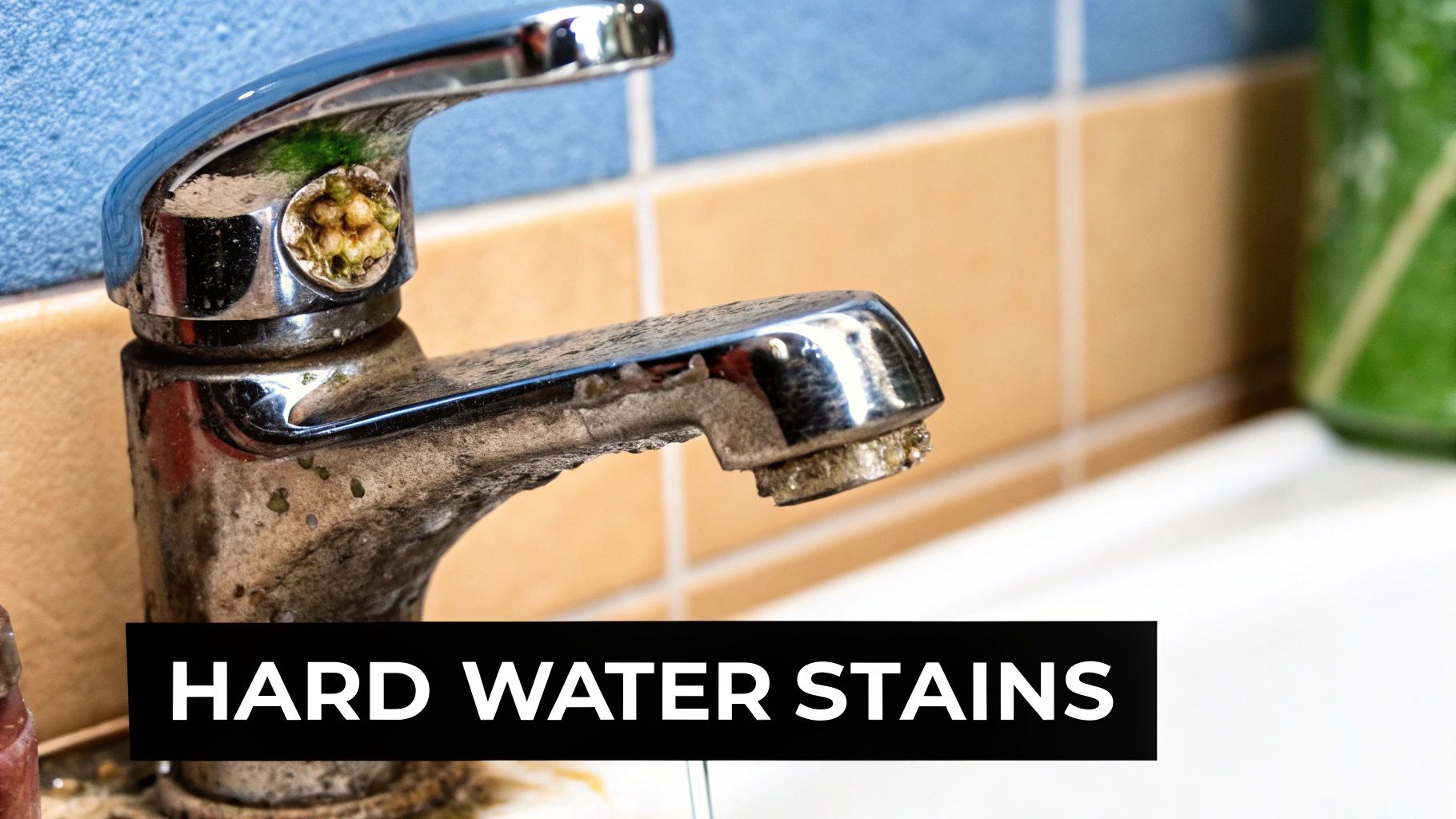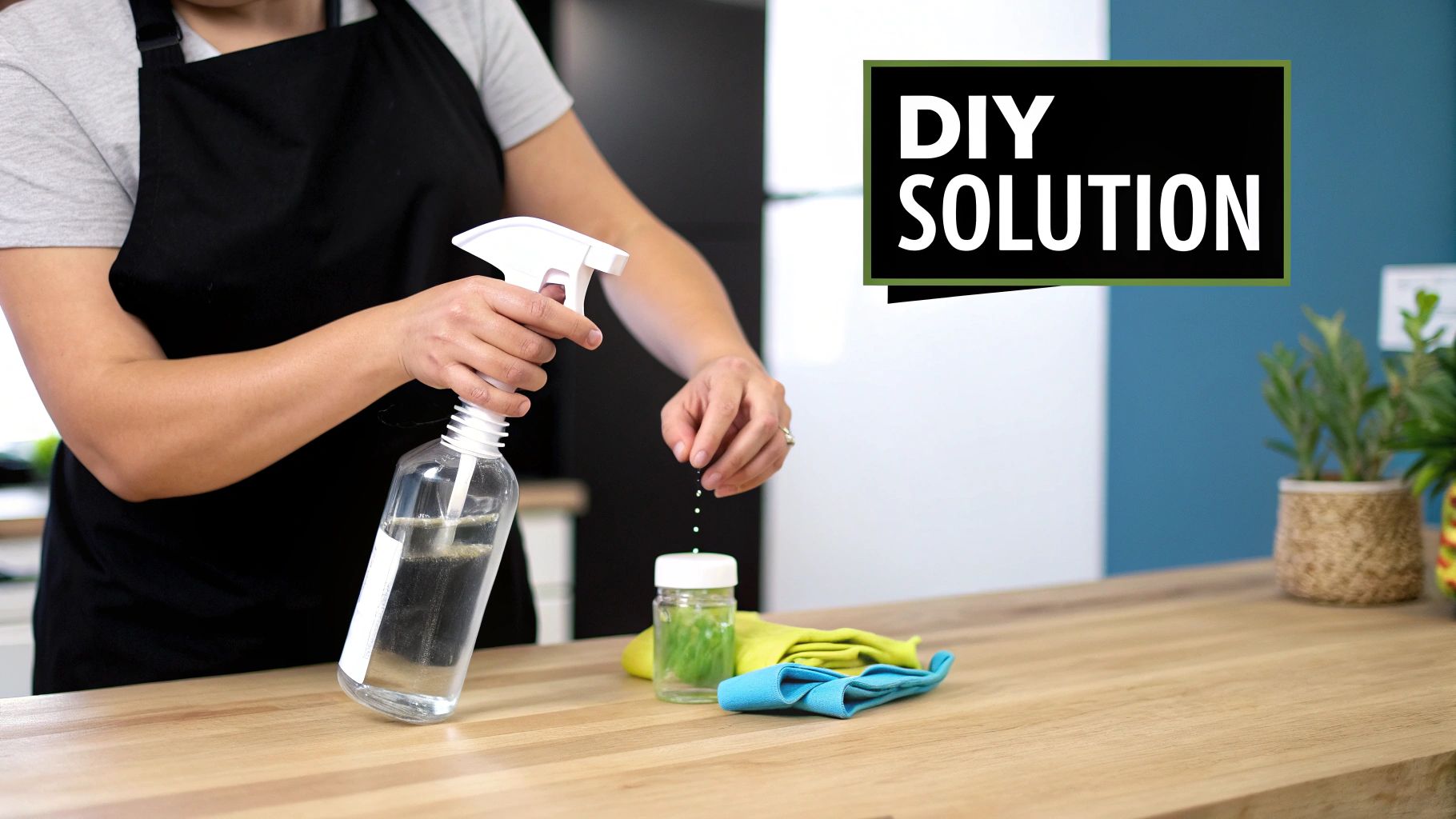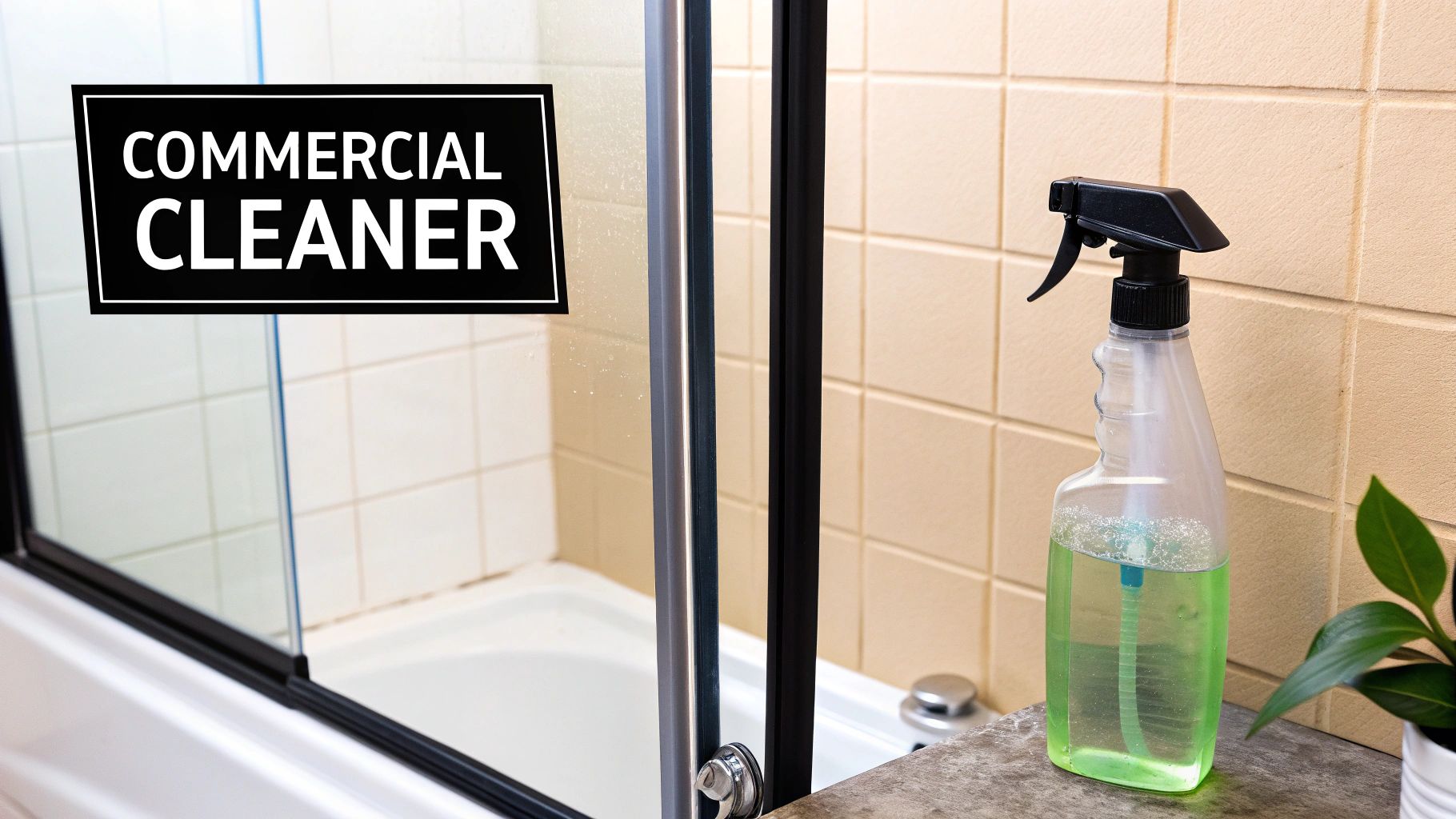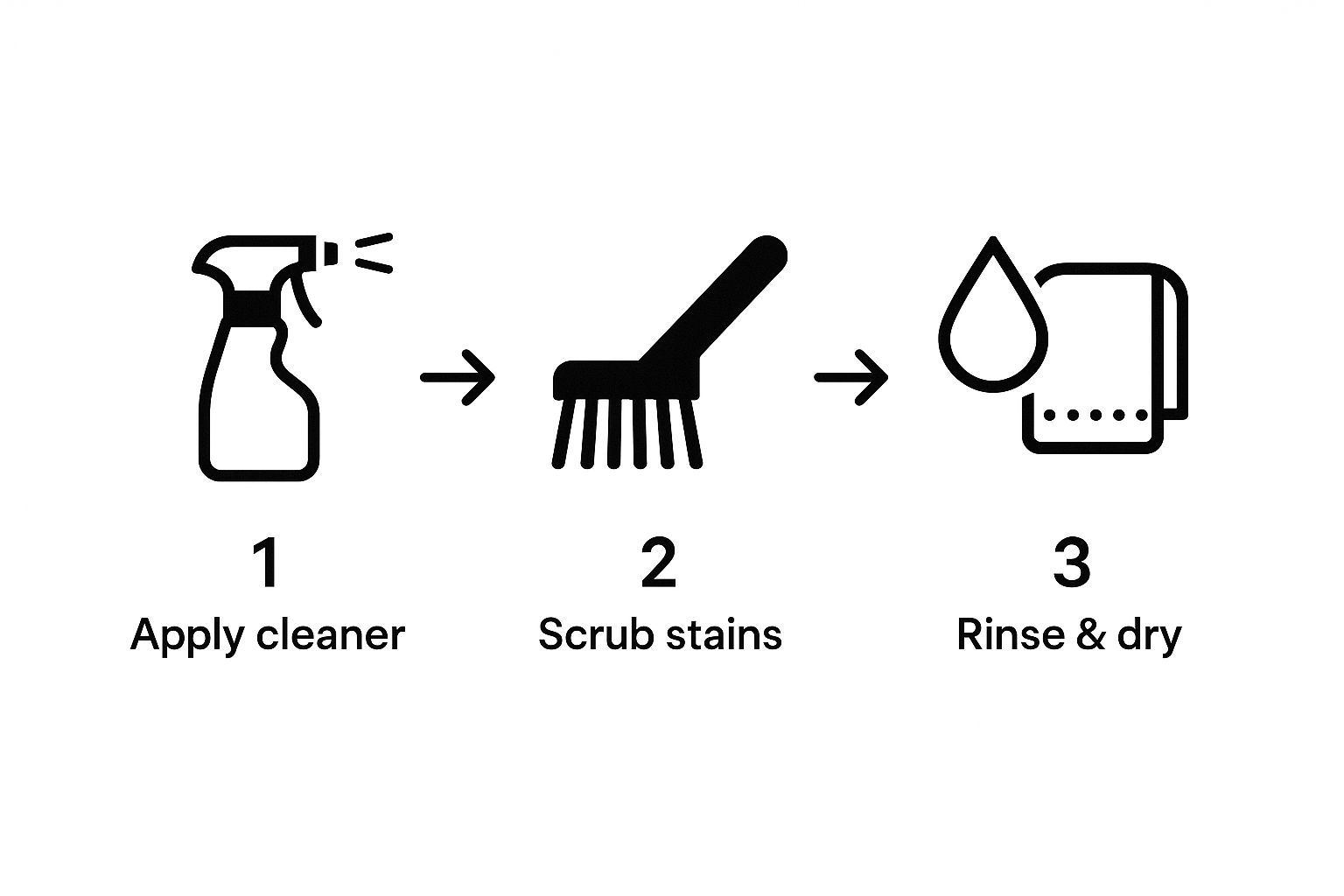You know the secret to getting rid of those frustrating hard water stains? It's not about scrubbing harder—it's about working smarter. The key is using a mild acid to break down the mineral deposits. You probably already have what you need right in your pantry, like white vinegar and lemon juice. These are fantastic for dissolving that chalky film on faucets, glass, and tile without reaching for harsh chemicals.
Your Quick Guide to Tackling Hard Water Stains

Those stubborn, chalky white marks from mineral-rich water can make even the cleanest home look a bit neglected. Commonly called limescale, these stains are just calcium and magnesium deposits that stick around after water evaporates. But here's the good news: the secret to removing them isn't brute force, it's chemistry.
At its core, the principle is simple. You need a mild acid to react with and dissolve the alkaline mineral gunk. This is exactly why household staples often outperform commercial products. Think of it as a targeted attack that breaks down the stain's structure, letting you wipe it away with minimal effort.
Choosing Your Cleaning Method
Your game plan for attacking hard water stains really depends on the surface you're cleaning and how bad the buildup is. There's no one-size-fits-all answer, but knowing your options is half the battle.
- DIY Acidic Solutions: This is where white vinegar and lemon juice really shine. Their natural acidity is perfect for dissolving mineral buildup on fixtures, showerheads, and glass doors.
- Gentle Abrasives: For tougher spots that need a little more persuasion, a simple paste of baking soda and water provides just enough grit to lift stains without scratching most surfaces.
- Commercial Cleaners: When your pantry items just aren't cutting it, specialized cleaners formulated for hard water can bring in the heavy artillery. Just be sure to double-check that the product is safe for the surface you're working on.
If you're dealing with stubborn spots, especially on your car, you'll find some great expert solutions for managing hard water challenges that often work just as well around the house.
To give you a clearer picture, here’s a quick rundown of what to use where.
Hard Water Stain Removal Methods at a Glance
This table breaks down the most common cleaning agents so you can pick the right tool for the job.
| Cleaning Agent | Best For | Application Method | Caution |
|---|---|---|---|
| White Vinegar | Faucets, showerheads, glass, coffee makers | Soak a cloth and wrap it around the fixture, or fill a bag and tie it to a showerhead. Let sit for at least an hour. | Avoid using on natural stone like marble or granite, as the acid can cause etching. |
| Lemon Juice | Glass doors, sinks, minor faucet stains | Cut a lemon in half and rub it directly on the stain. Let the juice sit before rinsing. | Less potent than vinegar, so it's best for lighter buildup. |
| Baking Soda Paste | Sinks, tubs, tile grout, stubborn spots | Mix with a little water to form a paste. Apply, let it sit, then scrub gently with a soft brush or sponge. | While gentle, test on a small, hidden area first to ensure it doesn't scratch the surface. |
| Commercial Cleaner | Heavy-duty buildup on approved surfaces | Follow the product's instructions carefully, which usually involves spraying, letting it dwell, and wiping. | Always check the label for surface compatibility and wear gloves for protection. |
Remember, no matter which method you choose, the key is giving it time to work.
Key Takeaway: The single most important tactic for cleaning hard water stains is patience. Whether you're using vinegar or a store-bought cleaner, you have to let the solution sit on the stain for at least an hour. This is what really breaks down those tough mineral bonds.
Think of this guide as your starting point. Whether you're fighting a cloudy shower door, a stained faucet, or filmy dishes, you've got this. By understanding the simple science behind the stains, you can confidently choose the right tool and get your surfaces sparkling again.
The Science Behind Stubborn Mineral Buildup
Ever scrubbed at those chalky white spots on your faucets and shower doors, only to have them reappear a week later? You’re not just imagining it. The culprit is hiding in plain sight: your water.
Those stubborn marks are called limescale, and they’re the classic calling card of hard water. Simply put, hard water has a high concentration of dissolved minerals. The two main offenders? Calcium and magnesium. When water evaporates, it leaves these microscopic minerals behind, which then bond to surfaces and create that tough, crusty buildup that seems impossible to clean. It’s not about how clean your home is; it’s a simple chemical reaction happening with every single water droplet.
From Water Droplet to Stubborn Stain
Picture a drop of water on your shiny chrome faucet. As the water part (H₂O) evaporates, the heavier calcium and magnesium ions are left behind. They don't just sit there—they crystallize into a solid, interlocking structure. That’s the birth of a hard water stain.
This is exactly why areas that are constantly wet are the biggest problem spots. Your shower glass, sink fixtures, and toilet bowl are in a constant cycle of getting wet and drying out. Each new splash adds another micro-layer of minerals, reinforcing the stain and making it that much harder to remove.
Expert Insight: Understanding this layering process is key. A quick wipe-down just skims the surface. To truly get rid of these stains, you need a cleaner that can penetrate and dissolve those mineral layers from the bottom up.
This isn’t just a problem in your home. The global market for technologies to combat water hardness was valued at around USD 1.83 billion in 2023. It’s expected to climb to about USD 3.09 billion by 2032, all because more people are recognizing hard water’s impact on everything from cleaning efficiency to appliance lifespan. You can dig into the specifics of this growing industry in this detailed market report.
Why Acidity Is Your Best Ally
So, how do you fight back against this mineral invasion? The secret is to reverse the chemical process that created the stain in the first place. Mineral deposits like calcium carbonate are alkaline, which means they react strongly with acids.
Here’s a breakdown of what happens when you use an acidic cleaner:
- Vinegar (Acetic Acid): When you apply something acidic like vinegar, it immediately gets to work on the calcium carbonate.
- Dissolving Action: The acid breaks down the solid mineral crystals, turning them into a water-soluble substance.
- Easy Removal: Once dissolved, the residue can be wiped or rinsed away without any harsh scrubbing.
This is why your pantry staples like vinegar and lemon juice are so effective. By understanding this basic science, you can stop the frustrating guessing game and start using a targeted strategy for a spotless, stain-free home.
Mastering DIY Solutions for Hard Water Stains

You don’t need a cabinet full of expensive, harsh chemicals to get rid of hard water stains. Believe it or not, the most powerful solutions are probably sitting in your kitchen pantry right now. They're cheap, eco-friendly, and you know exactly what’s in them because you made them yourself.
The real secret behind these homemade cleaners is acid. White vinegar contains acetic acid, and lemon juice has citric acid. Both are brilliant at breaking down the alkaline mineral deposits—mostly calcium and magnesium—that create those chalky, stubborn stains on your faucets and glass.
Harnessing the Power of Vinegar and Lemon Juice
Your best friend in the fight against limescale is plain old white vinegar. Its acidity slices right through mineral buildup, making it easy to wipe away without heavy scrubbing. Lemon juice works just as well and leaves a fresh, citrusy scent behind.
Let's say you have a faucet base caked in that familiar white scale. The fix is simple. Just soak a few paper towels in white vinegar, wrap them tightly around the stained area, and let them sit for at least an hour. The trick is to keep the surface completely soaked so the acid has time to do its job.
Pro Tip: Got a clogged showerhead? Fill a plastic sandwich bag with white vinegar, then tie it over the showerhead with a rubber band. Make sure the little spray holes are fully submerged and let it soak for a few hours or even overnight. You'll be amazed at how easily the gunk dissolves, restoring your water pressure.
A quick word of caution: because these solutions are acidic, you should never use them on natural stone surfaces like marble or granite. The acid can etch and permanently damage the finish.
Creating a Gentle Abrasive Paste
Sometimes, a liquid soak isn't quite enough. For those really tough, concentrated stains on sturdy surfaces like sinks or tubs, a baking soda paste gives you the perfect one-two punch of gentle scrubbing power and deep cleaning. It lifts stains without scratching up the finish.
Making the paste is as easy as it sounds. Just mix baking soda with a little bit of water until you get a thick, spreadable consistency.
Here’s my go-to method for a simple baking soda scrub:
- Mix: Combine about half a cup of baking soda with a few tablespoons of water.
- Apply: Smear the paste directly over the hard water stain.
- Wait: Let it sit for 15-20 minutes so it can break down the deposits.
- Scrub: Using a soft-bristled brush or a non-scratch sponge, gently scrub the area in a circular motion. The paste acts as a mild abrasive to lift the loosened minerals.
- Rinse: Wash the area thoroughly with water and dry it completely with a clean cloth. This last step is key to preventing new spots from forming right away.
This technique is a lifesaver for porcelain and ceramic surfaces that have built up a gritty layer of limescale. If you want to dive deeper into these tricks and others, check out our complete guide on how to remove hard water stains. By mastering a few simple, inexpensive methods, you can keep your home sparkling and free of mineral buildup.
When to Use Commercial Cleaners

While DIY solutions like vinegar and baking soda are fantastic first-line defenses, some hard water situations demand a little more muscle. If you've let your pantry staples soak and scrubbed with little success, it’s probably time to bring in the big guns with a commercial product.
This is especially true for older, heavily calcified stains that have had years to build up and bond with the surface. I've seen it countless times—those stubborn layers often need a specialized formula designed for maximum impact. When you're short on time and the buildup is severe, a targeted commercial cleaner can get the job done quickly and efficiently.
It's no surprise that the global market for water spot removers—products specifically for cleaning hard water stains—was valued at about USD 1.2 billion in 2024. This market is expected to shoot up to USD 2.5 billion by 2033, which shows just how many people are looking for effective mineral-fighting cleaners. You can see more data on this growing market and its drivers.
Decoding the Labels
Walking down the cleaning aisle can be overwhelming, with dozens of products all promising a miracle clean. The key is to know what you’re looking for based on your specific problem.
- Acidic Cleaners: These often use sulfamic or phosphoric acid, which are much more potent than the acetic acid in vinegar. They're excellent for dissolving heavy limescale on tough, non-porous surfaces like toilets and porcelain sinks.
- Abrasive Creams: These cleaners contain a fine abrasive powder mixed into a cream. Think of them as liquid elbow grease—perfect for scrubbing tough stains on durable surfaces like ceramic tile or stainless steel sinks, giving you both physical and chemical cleaning power.
- pH-Neutral Cleaners: While less common for hard water, these are absolutely essential for delicate surfaces. If you’re dealing with stains on natural stone like marble or granite, always look for a pH-neutral formula to avoid etching the finish.
Understanding these categories is the first step. For more in-depth advice on what to look for, you might find our guide on how to choose cleaning products for your home really helpful.
Crucial Tip: Always match the product to the surface. I can't stress this enough. Using a strong acidic cleaner on chrome can strip the finish right off, while an abrasive cream can leave permanent scratches on glass or acrylic. Always read the label and test the product on a small, hidden spot first.
Safe and Effective Application
Once you've chosen your product, how you apply it is everything. Safety should always come first. Commercial cleaners are far more concentrated than DIY solutions, so always wear gloves to protect your skin and make sure the area is well-ventilated to avoid breathing in strong fumes.
Follow the manufacturer’s instructions to the letter, especially regarding how long to let the product sit. Leaving a powerful cleaner on for too long can cause irreversible damage, but not leaving it on long enough will just lead to disappointing results.
With the right product and careful application, you can make even the most stubborn hard water stains a thing of the past.
Surface-Specific Guides for a Spotless Home
Cleaning hard water stains isn't a one-size-fits-all job. I’ve seen it time and time again: the technique that makes a porcelain toilet bowl sparkle could easily ruin a delicate chrome faucet. Success really comes down to matching the right method to the right material.
This section gets into the nitty-gritty for the most common problem areas I encounter in homes. Think of this as your go-to playbook for getting brilliant, damage-free results every time.
This simple visual breaks down the core steps for tackling most hard water stains.

The key takeaway here? Always dissolve the mineral bonds with a cleaner before you start scrubbing. It's the most efficient path to a spotless finish and saves you a lot of elbow grease.
Restoring Clarity to Glass Shower Doors
Cloudy, spotty shower doors can make an entire bathroom feel dingy. While glass is pretty durable, it’s also susceptible to etching if those stains sit for too long or if you get aggressive with the wrong tools. The goal is to dissolve the minerals without creating a network of fine scratches.
Your best approach here involves an acidic spray and a little bit of patience.
- Solution: A 50/50 mix of white vinegar and water in a spray bottle is the perfect starting point. For really stubborn jobs, a commercial cleaner specifically made for glass is a great backup.
- Tools: Grab a non-scratch scrub sponge, a squeegee, and a clean microfiber cloth.
- Method: Spray the entire glass surface until it's completely saturated. Now, walk away. Let that solution sit for at least 20-30 minutes to penetrate the mineral layers. Then, come back and use the non-scratch sponge to scrub in a circular motion. Rinse it all down with water, squeegee off the excess, and buff it dry with your microfiber cloth to prevent new spots from forming.
Safely Cleaning Chrome and Metal Faucets
Chrome faucets are notorious for showing every single water spot, but that shiny finish is surprisingly delicate. Please, never use abrasive powders or harsh scrubbing pads on chrome. You can easily scratch it or even strip the finish right off. For more specialized advice, like detailed instructions on how to clean skylights, it's always best to check guides focused on that specific task.
The secret to cleaning metal fixtures is to let a gentle acidic solution do all the heavy lifting for you.
Expert Tip: For that caked-on buildup around the base of a faucet, soak a few paper towels in white vinegar and wrap them tightly around the affected area. Let them sit for a full hour. When you come back, the constant contact with the acid will have dissolved even the most stubborn limescale, letting you just wipe it clean.
Deep Cleaning Stained Toilets
The porcelain surface of a toilet bowl is extremely durable, which is great news. It means you can bring out the stronger methods to tackle those ugly hard water rings that form at the waterline. While a daily swish with a brush helps prevent them, deep-set stains require a more targeted attack.
For toilets, you can use heavy-duty tools without much fear of causing damage.
What You'll Need
| Item | Purpose |
|---|---|
| Pumice Stone | Excellent for physically grinding away tough rings without scratching the porcelain. |
| White Vinegar | The go-to for an overnight soak to loosen deep-set mineral stains. |
| Toilet Brush | Perfect for your regular scrubbing and applying cleaning solutions. |
Before you begin, flush the toilet and then turn off the water supply valve, usually located on the wall behind it. Flush again to lower the water level in the bowl, which fully exposes the stain ring. Pour a generous amount of white vinegar in, making sure it covers the ring, and let it sit for several hours or even overnight.
The next morning, that stain will have softened considerably. Grab a pumice stone or a stiff toilet brush to scrub the ring away—it should come off with very little effort. Finally, turn the water back on, flush, and you’re all done.
How to Prevent Future Hard Water Buildup
After all that scrubbing, the last thing you want is for those chalky white stains to creep back in. And trust me, they will if you let them. The real secret isn't just cleaning them away; it's stopping them from forming in the first place. A few simple habits can make a world of difference.
The whole game is about not letting water sit around and evaporate. When water dries on a surface, it leaves behind all those minerals. Your mission? Don't give it the chance.
Adopt Simple Daily Habits
The easiest way to win the war against mineral deposits is with a little daily attention. Think of it as a two-minute investment that saves you from an hour-long scrubbing session down the road.
- Squeegee Shower Doors: This is a non-negotiable in my book. Keep a squeegee hanging in your shower and give the glass a quick once-over after you're done. It pulls all the water droplets away before they can dry and leave their mark.
- Wipe Down Faucets and Sinks: Grab a microfiber cloth and give your faucets, handles, and sink basin a quick dry after you use them. This is how you keep chrome and stainless steel looking brand-new.
- Dry Your Counters: Don't let those little puddles linger at the base of your faucets. A quick wipe is all it takes to stop limescale from getting a foothold on your countertops.
Consistent care is what really makes the difference, especially on large surfaces like glass doors. For more specific advice, this guide on maintenance tips for sliding glass doors has some great pointers.
Consider a Long-Term Solution
If you live in an area with seriously hard water, daily wiping can start to feel like a full-time job. When you're constantly fighting stubborn deposits on every surface, it might be time to think bigger. A water softener system can be an absolute game-changer.
These systems remove hard minerals like calcium and magnesium from the water before it even gets to your faucets.
Key Insight: A water softener tackles the problem right at the source. It doesn't just prevent new stains; it also helps your soaps and detergents lather better, leaves your skin and hair feeling softer, and can even prolong the life of appliances like your dishwasher and washing machine.
This kind of proactive approach is becoming more popular. The market for stain removers, which includes products for cleaning hard water stains, was valued at USD 22.27 billion in 2023 and is projected to hit USD 31.32 billion by 2030. People are tired of fighting stains and want real solutions.
Keeping surfaces dry also has a fantastic side benefit: it keeps mildew and mold at bay. For more on that, check out our guide on how to prevent bathroom mold. By combining these small daily habits with a long-term strategy, you can finally break the frustrating cycle of endless scrubbing.
Frequently Asked Questions About Hard Water
Even when you know the best cleaning tricks, hard water can still leave you with a few head-scratchers. We get a lot of the same questions, so let's clear up some of the most common ones to help you handle that mineral buildup like a pro.
Can Hard Water Stains Become Permanent?
The short answer is yes, they absolutely can. When you let those mineral deposits sit on a surface for too long—especially on glass—they can start to etch into the material. It’s a chemical process that creates tiny, microscopic pits, making the surface look cloudy or foggy no matter how much you scrub.
This is exactly why staying on top of your cleaning is so important. By wiping away the mineral scale before it has a chance to set in, you’re actively saving your shower doors, windows, and faucets from permanent damage.
Are Commercial Cleaners Safe for Septic Systems?
That’s a smart question, and the answer really depends on the specific product you’re using. Many acidic cleaners made for cleaning hard water stains are perfectly fine for septic systems if you use them as directed and not too often. However, some of the more aggressive, heavy-duty formulas can throw off the delicate balance of bacteria your system relies on.
Your Best Bet: Always flip the bottle over and look for a "septic-safe" label before you buy. If you're ever unsure, sticking with natural options like white vinegar and baking soda is always a 100% safe bet for your septic tank.
Why Do My Dishes Have White Spots After Washing?
Those frustrating white spots or that chalky film on your glasses are the classic calling cards of hard water. As the water from your dishwasher's cycle evaporates, it leaves behind all those calcium and magnesium deposits.
The best way to fight this is to use a rinse aid religiously. Rinse aids work by breaking the surface tension of the water, which makes it slide off in sheets instead of forming droplets that dry into spots. If your water is particularly hard, running a dishwasher cleaner designed to fight limescale once a month can make a huge difference and keep the machine itself running smoothly.
Tired of battling the endless cycle of hard water stains? Let the professionals at Custom Maids give your home the deep clean it deserves, leaving your surfaces sparkling and saving you valuable time. Schedule your free consultation today!

